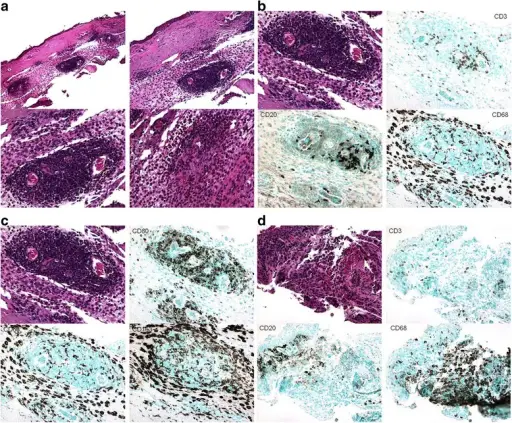Granulomatosis with polyangiitis is a systemic necrotizing vasculitis that typically involves the upper respiratory tract, lungs, and kidneys.
What is the Pathology of Granulomatosis with Polyangiitis?
The pathology of granulomatosis with polyangiitis is:
-Etiology: The cause of granulomatosis with polyangiitis is an abnormal type of circulating antibody called antineutrophil cytoplasmic antibodies (ANCAs). These antibodies attack small and medium-sized blood vessels.
-Pathogenesis: The sequence of events that lead to granulomatosis with polyangiitis is when an initial inflammation-causing event provokes an abnormal immune system reaction which causes granulomas and constricted inflamed blood vessels.
-Histology: The histology associated with granulomatosis with polyangiitis shows granulomatous inflammation, necrosis, and vasculitis.
How does Granulomatosis with Polyangiitis Present?
Patients with granulomatosis with polyangiitis typically are adults 40 to 60 years old. The symptoms, features, and clinical findings associated with granulomatosis with polyangiitis include rhinitis, a runny and stuffy nose, cough which may include blood, ear infections, joint aches, loss of appetite, malaise, or a general feeling of being unwell, nosebleeds, shortness of breath, sinusitis, skin sores, swelling of joints, eye pain, burning sensation in the eyes, eye redness, vision problems, fever, weakness often due to anemia, unintended weight loss, and blood in the urine.
How is Granulomatosis with Polyangiitis Diagnosed?
Granulomatosis with polyangiitis is diagnosed by lab tests to check for signs of inflammation, anti-neutrophil cytoplasmic antibodies, anemia, or signs that kidneys aren’t properly filtering waste products from the blood. Urine tests can reveal whether urine contains red blood cells or has too much protein, which might indicate that the disease is affecting kidneys. CT or MRI can help determine which blood vessels and organs are affected. A biopsy can confirm a diagnosis of granulomatosis with polyangiitis.
How is Granulomatosis with Polyangiitis Treated?
Granulomatosis with polyangiitis is treated with corticosteroids. Immunosuppressive drugs may cause long term remission and reverse hearing loss and facial palsy.
What is the Prognosis of Granulomatosis with Polyangiitis?
The prognosis of granulomatosis with polyangiitis is fair. Granulomatosis with polyangiitis can lead to a rapidly progressive glomerulonephritis, a syndrome of the kidney that, if left untreated, rapidly progresses into acute renal, or kidney failure. About 75 % of people with the condition go on to develop kidney disease.


